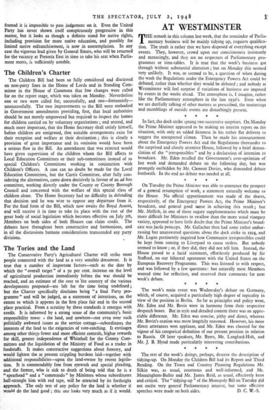AT WESTMINSTER
THE remark in this column last week, that the remainder of Parlia- mentary business will be mainly tidying up, requires qualifica- tion. The truth is rather that we have disposed of everything except events. They, however, crowd upon our consciousness insistently and menacingly, and they are no respecters of Parliamentary pro- grammes or time-tables. It is true that the week's business got through without substantial alteration ; but on Monday this seemed very unlikely. It was, or seemed to be, a question of when during the week the Regulations under the Emergency Powers Act could be debated, rather than whether they would be debated ; and nobody at Westminster will feel surprise if variations of business are imposed by events in the weeks ahead. The atmosphere is, I imagine, rather like the Parliamentary atmosphere in the late 1930's. Even when we are dutifully talking of other matters as prescribed, the mutterings and mumblings of outside events are disturbingly present.
In fact, the dock strike sprang two successive surprises. On Monday the Prime Minister appeared to be making an interim report on the situation, with only an added firmness in his rather flat delivery to suggest the unexpected climax. Then he made his announcement about the Emergency Powers Act and the Regulations thereunder to the surprised and closely attentive House, followed by a brief denun- ciation of the " irresponsibles " and by a declaration of intention to broadcast. Mr. Eden recalled the Government's over-optimism of last week and demanded debate on the following day, but was promptly outbidden by Mr. Clement Davies, who demanded debate forthwith. In the end no debate was needed at all.
On Tuesday the Prime Minister was able to announce the prospect of a general resumption of work, a statement naturally welcome to the House. No official apportionment was made of the shares, respectively, of the Emergency Powers Act, the Prime Minister's broadcast, and general good wise in achieving this result ; but Mr. Mellish, in one of those sugary supplementaries which must be more difficult for Ministers to swallow than the more usual vinegary variety, appeared to have little doubt that the Prime Minister's broad- cast was facile princeps. Mr. Gallacher then had some rather embar- rassing but unanswered questions about the dock strike in 1924, and Mr. Logan pertinently inquired how Communist irresponsibles could be kept from coming to Liverpool to cause strikes. But nobody seemed to know ; or, if they did, they did not tell him. Instead, the House passed to a lucid statement, effortlessly produced by Sir Stafford, on our bilateral agreement with the United States on the European Recovery Programme. This was listened to with respect, and was followed by a few questions : but naturally most Members wanted time for reflection, and reserved their comments for next week's debate.
* * * * The week's main event was Wednesday's debate on Germany, which, of course, acquired a particularly high degree of topicality in view of the position in Berlin. So far as principles and policy went, Mr. Eden and Mr. Bevin were in harmony from their respective despatch boxes. But in style and detailed content there was an appre- ciable difference. Mr. Eden was concise, pithy and direct, whereas Mr. Bevin's oration was more lengthily reasoned. However, his more direct utterances won applause, and Mr. Eden was cheered for the vigour of his categorical definition of our present position in relation to Russia. Of later speakers, Mr. Byers, Mr. Langford-Holt, and Mr. J. B. Hynd made particularly interesting contributions.
* * * * The rest of the week's doings, perhaps, deserve the description of tidying-up. On Monday the Children Bill had its Report and Third Reading. On the Town and Country Planning Regulations Mr. Silkin was, as usual, courteous and well-informed, and Mr. Manningham-Buller and Mr. James Reid, as usual, effectively keen and critical. The " tidying-up " of the Monopoly Bill on Tuesday did not excite very general Parliamentary interest, but some effective
speeches were made on both sides. D. C. W.-S.






































 Previous page
Previous page